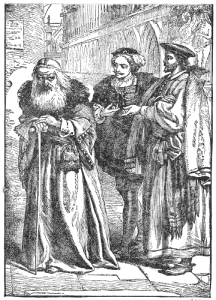I’ve read several Shakespearean plays throughout my high school career. These include the classics of Romeo and Juliet, Othello, and King Lear. However, I never learned about The Merchant of Venice, the only Shakespearean play with a prominent Jewish character. Last month, I saw this play performed live at the Johnson County Community College’s (JCCC) Polsky Theater. While reading the pamphlet before the play started, I learned that in 65 years, this play had only been performed twice in Kansas City. And I had to wonder: why? As I sat through the play and watched the actors perform and the audience’s reaction, I found my answer.

The Merchant of Venice is believed to have been written between 1596 and 1598. It is considered one of Shakespeare’s “comedies” about a Jewish moneylender, Shylock, who wants revenge against a Christian who defaulted on his loan. In the production of the play that I saw, he was dressed in a ragged robe with a large kippah on his head and a long beard. The script seems to depict Shylock as a villain. However, this is often debated due to the stark anti-Semitism and cruelty directed toward Shylock. He is punished at the end of the play and forced to convert to Christianity. To Shylock, this is the worst possible sentence he could receive. His religion was everything to him. So I had to wonder, is Shakespeare’s play anti-Semitic or a plea for tolerance?
This is a difficult question to answer because the play was written in 16th century England, a place with no Jews. The Jews were expelled in 1290 by an edict of King Edward I. It is very possible that Shakespeare never even met a Jew in his life. He could have simply made a Jew an evil character because Jews were a popular target for hatred during Queen Elizabeth’s reign (r.1598-1603). I am not sure what to believe about Shakespeare’s original intentions, but the obvious anti-Semitism in the play is the main reason it is rarely performed in Kansas City.

The production I saw at the JCCC was an interesting experience. The play was altered slightly in that the director’s and actors’ intentions were for the audience to feel sympathy for Shylock. But as I sat through this play, I felt uncomfortable. Every time Shylock was made fun of or pushed I felt victimized because of my Jewish identity. I was also disgusted by some of the insults and words directed towards Shylock. Since the play is classified as a “comedy,” the audience laughed at several parts where Shylock was mistreated. This especially made me cringe in my seat. The scene in which Shylock was told that he must convert to Christianity made my heart ache but some in the audience laughed. I believe that people laughed because they themselves felt uncomfortable.
During a talk with the actors after the show, they made it clear they wanted to highlight that anti-Semitism has been prominent throughout history and is not acceptable in this day in age. They preached the version of this play as a plea for tolerance. I liked that the play was given a sympathetic touch towards Shylock. I was also pleasantly surprised to hear several audience members tell the actors how they felt for Shylock and that they are thankful to live lives in which they do not witness or take part in extreme acts of anti-Semitism.
As uncomfortable as this play was to watch, it is very important. I agree with the actors in that The Merchant of Venice can be seen as plea for tolerance. So many different types of people are persecuted across the world today, not just Jews. Sitting through this play forces the audience to witness terrible cruelty toward a person based upon their religion. It is not often that people in Kansas City will see something like that and not have the chance to walk away. Even if the play was originally anti-Semitic, it can have a different message today. I took away that there are cruel people in this world and it is important for all members of society to realize that unfortunate fact, confront it, and prevent future discrimination of any kind.





















































































